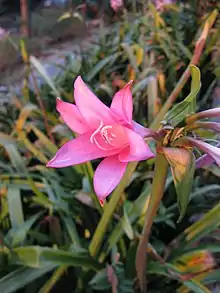| × Amarcrinum | |
|---|---|
 | |
| Scientific classification | |
| Kingdom: | Plantae |
| Clade: | Tracheophytes |
| Clade: | Angiosperms |
| Clade: | Monocots |
| Order: | Asparagales |
| Family: | Amaryllidaceae |
| Subfamily: | Amaryllidoideae |
| Genus: | × Amarcrinum Coutts[1] |
The scientific name × Amarcrinum is applied to those hybrid plants obtained from artificial crosses between the genera Amaryllis and Crinum,[1] although as of March 2014, the World Checklist of Selected Plant Families regards the name as "unplaced".[2] They are grown as ornamental plants in gardens.
Description
There are several variations possible since many species of Crinum can be combined with either of the two species of Amaryllis to produce hybrids with different characteristics. In general, almost all the hybrids have been between Crinum powellii and Amaryllis belladonna. This bulbous garden perennial has wide, deep green, tough, leathery, strap-shaped leaves to 60 cm long. The flower colour and exact growth habit will vary depending on which parental species have been used to make the cross but all of them are sweetly scented like Amaryllis with the tidy habit of evergreen Crinum. During late summer loose umbels of large, scented, pink funnel shaped flowers are held on stout stems, around 10 to 15 blooms on each.
Hybrid species
Two species have been named,[1] although neither name is accepted by the World Checklist of Selected Plant Families.[3]
- × Amarcrinum memoria-corsii (Ragionieri) H. E. Moore is the result of crossing Amaryllis belladonna × Crinum moorei.
- × Amarcrinum traubii is the triple hybrid obtained by crossing Amaryllis × parkeri 'Hathor' × Crinum moorei.
Uses
Several cultivars of × Amarcrinum have been raised and all of them are used as ornamental plants.[4]
References
- 1 2 3 Vigneron, P. (2007). "× Amarcrinum". Amaryllidaceae organization. Retrieved 2009-06-02.
- ↑ "× Amarcrinum". World Checklist of Selected Plant Families. Royal Botanic Gardens, Kew. Retrieved 2014-03-28.
- ↑ "Search for Amarcrinum". World Checklist of Selected Plant Families. Royal Botanic Gardens, Kew. Retrieved 2014-03-28.
- ↑ "×Amarcrinum". Pacific Bulb Society. Retrieved 2014-02-28.